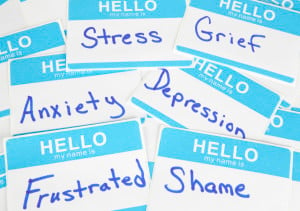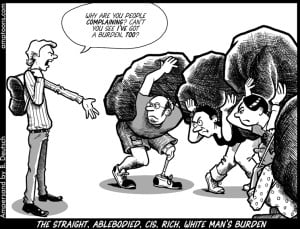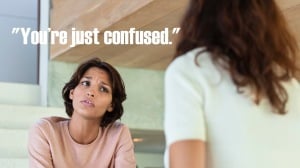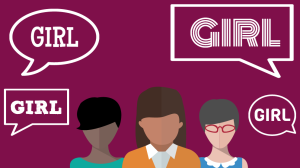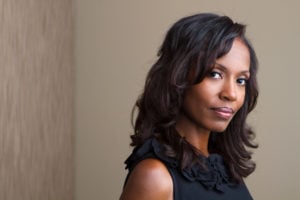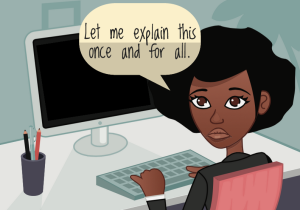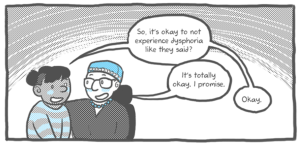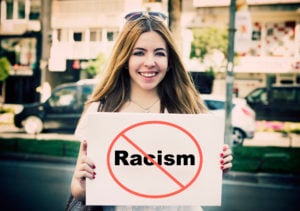A few months ago, I received a hurt message from a young woman, who, in a fit of body positivity, had written an article for a popular publication about her bravery in defeating some of her own demons, wearing a bikini in public for the first time in years.
She felt good – of course she felt good! – and wanted to share her story both to receive validation from her peers and, perhaps, with the hope of inspiring others to shed the towel, too. Of course, a huge reason why we share our stories is to be met with both gratitude and congratulation.
The response to her article, though, was mixed.
While some people out there still appreciate a story about any person who has conquered the body negativity monster and were vocal in their support, others rolled their eyes, leaving comments about how boring it is to read – yet again – another article about body positivity coming from a conventionally attractive, thin woman.
And this young woman was upset. Here, she had broadcasted her courage to an audience of millions, and then was told that it was useless, boring, and potentially even oppressive.
So the fact that she was in tears in my inbox should have come as no surprise to me. And as another conventionally attractive, thin woman who writes articles about body acceptance, you’d think that I would have immediately felt compassion for her.
But I didn’t. Truth be told, at first, I was annoyed.
I was annoyed that I had received yet another e-mail, arguing the case against thin privilege. I was annoyed that yet another person wasn’t grasping how they hurt fat people, even inadvertently, with their actions.
And I was annoyed because I felt like the double truth here was clear: that her article (and the actions that inspired it) were empowering for her, and simultaneously, that the argument about thin women dominating conversations about body image is accurate.
But when I felt that familiar feeling of annoyance creep up, I had to give pause. Because who the fuck am I to look down on another thin woman as someone who “doesn’t get it?” Since when have I been someone who “gets it?”
And how often in my life have I wished to have a mentor in this confusing space of doing body acceptance work in a thin body? Daily?
And suddenly, I realized how little we – as thin women, together – talk about this.
Sure, many of us try to learn from the work being done by fat activists. We read the articles that they post, follow their Instagram accounts, and retweet their advice on how thin people can do better.
But how often are we, as thin women, extending compassion and holding space for one another, sharing what we know and what we don’t know, trying to work out solutions for doing this work less oppressively?
The truth is: There are far too few conversations between thin women asking hard questions like “How can we balance our own body acceptance journey with centering the more marginalized in our communities?” and “How do we hold one another accountable in activism, so that others don’t have to take up that labor?”
But we should be talking to one another, trying to figure this shit out.
We have to. Because our work can too easily further marginalize fat people. And when our work, no matter how many #bopo hashtags we throw on it, hurts fat people, we’re failing.
And it isn’t up to them to point that out and guide us toward doing better. We should be doing it ourselves.
But we’re not. Not regularly, anyway. And I’d like us to start.
I want us to actively participate in that conversation. I want us to role model for one another. I want our role in this movement to be one that is more helpful than it is harmful.
I want us to get more comfortable saying, “Hey. This is what I’ve learned from my mistakes about my thin privilege in this movement. And here’s how we can move forward.”
Because I’m still imperfect. I fuck up on the regular. And I’m still learning how to let that lead me to learning, both from confrontation and introspection.
I’m learning how (and why) to take more time to reflect on how to do my body acceptance work more appropriately and less oppressively.
And there’s no need to keep that to myself, to tuck it away into a pocket of my brain to help me do better moving forward. Instead, I can call in my fellow thin body acceptance advocates.
And I can do more to invite us to take more time to explore, together, how, when, and where to insert our experiences and expertise.
So here’s a start. Here’s my invitation to you for us to do more learning, openly, together. No RSVP required.
1. Talk Less For and Over Fat People – And More With and About
One of my favorite Twitter relationships is the one that I have with my friend Cathy.
She’s brilliant. She’s hilarious. She’s a beauty product smarty pants. And she’s Australian – which means she has a super cute accent, to boot.
And we met one day when she tweeted at me to tell me I was a shit ally.
I was tweeting something – self-righteously, if accurately – about how fellow white people need to talk less and listen more in conversations about race.
And Cathy was like, “And you don’t think that you talk for and over fat people?”
And I was like, “Damn.”
Actually, what I wanted to be like was “NO!” – which is generally always our initial, knee-jerk reaction to being called out on iffy allyship attempts. But because it wasn’t the first (or last) time that I had been called into question about potentially making a career off of talking about an experience that wasn’t mine, I sat with it.
And I realized that maybe I really do talk about fat acceptance a little too much.
More specifically, I realized that maybe I’ve talked a lot about fat acceptance in the wrong way. Because if I’m practically claiming it for myself as something I get to rant and rave about, then I’m not really pushing a paradigm shift around fat acceptance.
I’m just making myself look smart and compassionate, building off of the hard work of people more marginalized than I am. And that’s oppressive.
When you’re coming from a place of privilege, that’s unfortunately really easy to do. When you’re a thin person who’s always been seen as more rational and trustworthy than fat people, it’s easy to say, “I’ve got this.”
But we can’t take opportunities to show off our own smarts, sass, and politics. Instead, we should be using that energy to amplify the voices of others (more on that in #2) and approach these conversations from where we do have useful voices.
And it is with people who hold our same privileges that our voices are most useful in the discussion about fatphobic oppression.
Because as amped up as we might get about it, the world doesn’t really need more thin people to shout into the void about body acceptance and fat liberation.
It needs us to do the, perhaps less glamorous, work of having conversations with those who are like us about the ways in which we’re all perpetuating sizeism.
Fat people are already saying smart, sassy, radical shit about size. What thin people can do is talk more about stuff like how to be appropriate allies, how to knock fatphobia out of eating disorder recovery advocacy, and how to change the way we talk about fitness to be less triggering to those who have experienced weight-related abuse.
That is, let’s learn to stay in our lane. Because in conversations outside of our realm of reality, it’s best to take a seat (or two), listen, learn – and share. Not to create buzz for our own brilliance.
So take more time to talk to your thin buddies about how they’re perpetuating oppression. And in the meantime, read, retweet, and donate to fat activists.
2. Be Careful of Conflating Lowercase ‘fat’ with Uppercase ‘Fat’
When 2015 was fast approaching – and therefore, everyone was gearing up for their brand new miracle diet that was going to save them from the depths of hell (or something), I wanted to do something meaningful for my eating disorder recovery community – something to remind them that their size was fine just the way it is, weight restoration and all.
I thought about how shitty it was that our entire culture is so anti-fat that people in eating disorder recovery can hardly escape being told constantly, just like everyone else, that any modicum of fat on their bodies is an embarrassment. And that can be triggering as all hell.
So I thought, “Hey! Why not start a little social media campaign to help normalize fat, particularly in this ‘New Year, New You’ time period when alternative narratives are necessary to combat the capitalistic bullshit?”
I imagined the glory of Instagram feeds filled with butt shots of cellulite (which virtually everyone has) and gifs of jiggling arm flab, celebrating the fat on our bodies instead of demonizing it (it keeps us alive, after all).
And that would have been all good and well if I had considered that fat as a thing on your body and Fat as an identity and marginalized experience are two different things.
And by asking folks to normalize the former, I’d inadvertently marginalized the latter.
Amanda Levitt – someone I deeply respect and whose co-run This Is Thin Privilege blog you should definitely check out – tweeted in response to the campaign. She noted something along the lines of “This is why thin people shouldn’t have leadership roles in the fat acceptance movement.” And it was another huge “oops” moment.
Read: Oops, I was accidentally oppressive again.
I failed to take into consideration that the difference in these experiences matters and that centering (potentially) non-fat people in a conversation about fat is by no means revolutionary. It reifies the status quo – which is exactly the problem.
Does that mean that we, as thin people, can never talk about the fat on our bodies and how we’re brainwashed to hate it? No.
But it does mean that we have to remember that this spoon-fed guilt and shame is a symptom of a larger fatphobic culture, wherein people who are actually fat (not people who “feel” fat) receive the brunt of the oppression.
We have to note the differences between lowercase “fat” and uppercase “Fat” and question which we’re centering our conversations around and how we’re understanding our experiences in relation to them.
Think of it this way: It’s the difference between using the #ThickThighsSaveLives hashtag and one that reads #NoThighGapNoProblem instead.
It seems like a small difference, but it’s not.
3. Consider When to Share Publicly – And When Sharing Privately Is Better
I struggle with this a lot in a world where privacy and public presence are so blurred by social media.
If I use my Instagram primarily for photojournaling my day-to-day life and not for activism, but it’s an unlocked account on an open platform, is that private or public?
If I cultivate my friends list on Facebook to be only people who I know IRL or otherwise have a strong relationship with, is what I share there among friends or among a public audience?
What are the rules, really, to how the importance of radical media representation applies to self-governed online spaces?
Because of my thin privilege, I might not think about how I’m hurting, hindering, or upsetting others. I might get so wrapped up in my own journey that I forget that it’s situated within a much larger web.
For example, I might post an image of my stomach rolls or my thighs touching on Instagram for my own benefit of normalizing my body in a sea of filtered perfection – only to have someone else kindly nudge me to say, “Umm, Melissa…”
Because whether or not something is intended for a specific audience, when we share it in a public space, other people are exposed to it.
And that means that we’re having an effect on the landscape of body politics – whether we like it or not.
So if I post a picture of my hips with the note “Everyone has stretch marks,” who might that feel empowering to? Me, for sure. Others who look like me, probably. My friends who love me and want to see me happy, maybe.
But is it helpful to some trans folks whose last body woe might be stretch marks? Is it helpful to people of color who can’t easily hide the physical traits that bring racism front and center in their lives? Is it helpful to disabled folks who, daily, face ableist narratives around how their bodies look and work?
No, not really. In fact, probably not at all. And it’s definitely not helping fat people to have my thin self centered in a conversation that’s really about their oppression.
And I know that. Because even when I see women who are thinner or more attractive than me posting body positive mantras and pictures of how their tiny stomachs scrunch up when they sit down, the first thing I think is not “Oh hell yeah, I feel so empowered by her empowerment.” It’s usually “Shut up.”
It’s “People out here have real problems with oppression, and you’re taking up space?”
And then I remember how many people likely think that about me – and it gives me some perspective.
And it reminds me to give pause the next time I want to post something like that myself – and maybe send the body shot to my partner instead or to start a “Body Love” photo album in my phone for my eyes only.
Because just like a tree that falls in the woods still makes a sound when no one’s there to hear it, moments of triumph are still triumphant when no one’s there to “like” it.
And no amount of “likes” can make up for the damage that we do to the movement that we’re supposedly fighting for.
***
Here’s the truth: Navigating this shit is hard, and there’s no rulebook on how to be the most righteous, radical activist, advocate, and ally out there. Mostly, it’s a lot of trial and error – making mistakes, apologizing for them, and learning from them – all with the understanding that this internal work will never be done.
And I think it’s better to share those experiences to help us all move forward – both in the knowledge of how to avoid pitfalls and in the understanding that mistakes are part of the process.
Because what happens when we don’t talk to one another, when we don’t make staying in conversation with other thin women about our privilege central to our work, is that we continually hurt those most marginalized in this battle. And if our work, honest as it may be, is hurting fat people, then we’re not doing the work after all.
And, so, to the young woman who wrote to me about her bathing-suit-article-triumph-gone-frustration: You didn’t do a bad thing by sharing your story – none of us are. It’s powerful and necessary for our stories to be told, and it’s powerful and necessary for us to be affirmed in the courage that we show in fighting against oppression.
But it’s also powerful and necessary for us to recognize when to take a step back and reevaluate how we, too, contribute to pain in the world – and to think through how to stop.
So if you write to me again, looking for an ear, a shoulder, or some advice, I’ll welcome it openly. And I hope you – all of you – will do the same for me.
[do_widget id=’text-101′]
Melissa A. Fabello, Co-Managing Editor of Everyday Feminism, is a body acceptance activist and sexuality scholar living in Philadelphia. She enjoys rainy days, tattoos, yin yoga, and Jurassic Park. She holds a B.S. in English Education from Boston University and an M.Ed. in Human Sexuality from Widener University. She is currently working on her PhD. She can be reached on Twitter @fyeahmfabello.
Search our 3000+ articles!
Read our articles about:
Our online racial justice training
Used by hundreds of universities, non-profits, and businesses.
Click to learn more
Most Read Articles
- « Previous
- 1
- …
- 30
- 31
- 32






